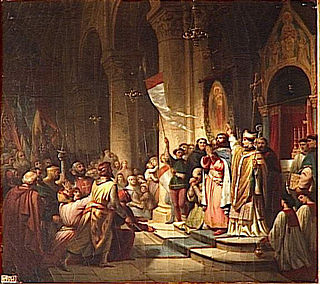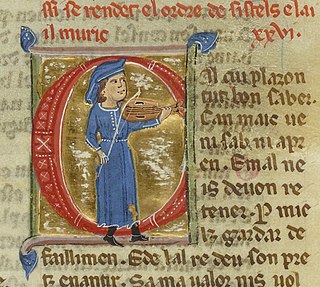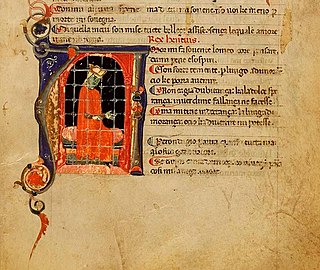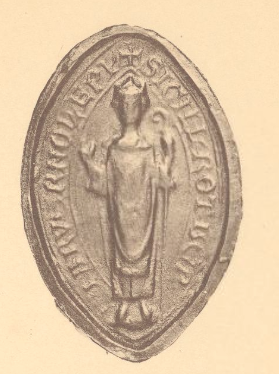
Year 1201 (MCCI) was a common year starting on Monday of the Julian calendar.

A troubadour was a composer and performer of Old Occitan lyric poetry during the High Middle Ages (1100–1350). Since the word troubadour is etymologically masculine, a female equivalent is usually called a trobairitz.

"The Knight's Tale" is the first tale from Geoffrey Chaucer's The Canterbury Tales.

Lord Edward's Crusade, sometimes called the Ninth Crusade, was a military expedition to the Holy Land under the command of Edward, Duke of Gascony in 1271–1272. It was an extension of the Eighth Crusade and was the last of the Crusades to reach the Holy Land before the fall of Acre in 1291 brought an end to the permanent crusader presence there.
Occitan literature is a body of texts written in Occitan, mostly in the south of France. It was the first literature in a Romance language and inspired the rise of vernacular literature throughout medieval Europe. Occitan literature's Golden Age was in the 12th century, when a rich and complex body of lyrical poetry was produced by troubadours writing in Old Occitan, which still survives to this day. Although Catalan is considered by some a variety of Occitan, this article will not deal with Catalan literature, which started diverging from its Southern French counterpart in the late 13th century.

Bertran de Born was a baron from the Limousin in France, and one of the major Occitan troubadours of the 12th-13th century. He composed love songs (cansos) but was better known for his political songs (sirventes). He was involved in revolts against Richard I and then Phillip II. He married twice and had five children. In his final years, he became a monk.

Guido Cavalcanti was an Italian poet. He was also a friend and intellectual influence on Dante Alighieri.

Enzo was an illegitimate son of the Hohenstaufen emperor Frederick II, who appointed him 'King of Sardinia' in 1238. He played a major role in the wars between Guelphs and Ghibellines in the Imperial kingdom of Italy, and was captured by his enemies in 1249. He remained imprisoned in Bologna until his death.

Peire Cardenal was a troubadour known for his satirical sirventes and his dislike of the clergy. Ninety-six pieces of his remain, a number rarely matched by other poets of the age.

The Battle of Fossalta was a battle of the War of the Guelphs and Ghibellines in Northern Italy. It took place in Fossalta, a small location on the Panaro River, and is especially remembered for the capture of Enzio of Sardinia, son of Emperor Frederick II of Hohenstaufen.

Gaucelm Faidit was a troubadour, born in Uzerche, in the Limousin, from a family of knights in service of the count of Turenne. He travelled widely in France, Spain, and Hungary. His known patrons include Geoffrey II, Duke of Brittany and Dalfi d'Alvernha; he was also at one time in Poitiers at the court of Richard I of England, for whose death he wrote a famous planh (lament) in 1199. It is possible, though controversial, that Gaucelm took part in the Third Crusade from 1189–1191; it seems clear that in 1202 he set out on the Fourth Crusade, as did his then-patron, Boniface of Montferrat, but after 1202 there is no further historical trace of Gaucelm.

Raimbaut de Vaqueiras or Vaqueyras was a Provençal troubadour and, later in his life, knight. His life was spent mainly in Italian courts until 1203, when he joined the Fourth Crusade. His writings, particularly the so-called Epic Letter, form an important commentary on the politics of the Latin Empire in its earliest years. Vaqueiras's works include a multilingual poem, Eras quan vey verdeyar where he used French, Tuscan, Galician-Portuguese and Gascon, together with his own Provençal.
Adelasia (1207–1259), was the Judge of Logudoro from 1236 and the titular Judge of Gallura from 1238.

Palazzo Re Enzo is a palace located on Piazza del Nettuno, 1 in the historic center of Bologna, northern Italy. The palace takes its name from Enzio of Sardinia, Frederick II's son, who was prisoner here from 1249 until his death in 1272. The palace is presently used to sponsor cultural events and exhibitions.

Peirol or Peiròl was an Auvergnat troubadour who wrote mostly cansos of courtly love in the late twelfth and early thirteenth centuries. Thirty-four surviving poems written in Occitan have been attributed to him; of these, seventeen have surviving melodies. He is sometimes called Peirol d'Auvergne or Peiròl d'Auvèrnha, and erroneously Pierol.
Luchetto Gattilusio was a Genoese statesman, diplomat, and man of letters. As a Guelph he played an important role in wider Lombard politics and as a troubadour in the Occitan language he composed three poems descriptive of his times.

Guilhem Ademar was a troubadour from the Gévaudan in France. He travelled between the courts of Albi, Toulouse, Narbonne, and Spain. He achieved fame enough during his life to be satirised by the nobleman and monk, Monge de Montaudon. Guilhem entered holy orders towards the end of his life. Sixteen poems—fourteen cansos, a sirventes, and a partimen with Eble d'Ussel—form his surviving corpus. His cansos are his most famous pieces. Usually humorous, several mock the poetry of Ademar's more illustrious contemporary Arnaut Daniel. One canso survives with a tune.

Gilabert de Próixita was a Valencian poet with twenty-one extant Occitan pieces. He is credited by his first editor with a renovellament (renewal) of Catalan poetry through the incorporation of Italian and French ideas into a model of courtly love taken from the classical troubadours. His last name is variously spelled Próxita, Próxida, and Progita in medieval orthography.

Robert of Auvergne, also called Robert de la Tour, was a French nobleman, prelate and poet from the Auvergne. He served as bishop of Clermont from 1195 until 1227 and thereafter as archbishop of Lyon until his death. He was also a troubadour, composing poetry in Occitan.